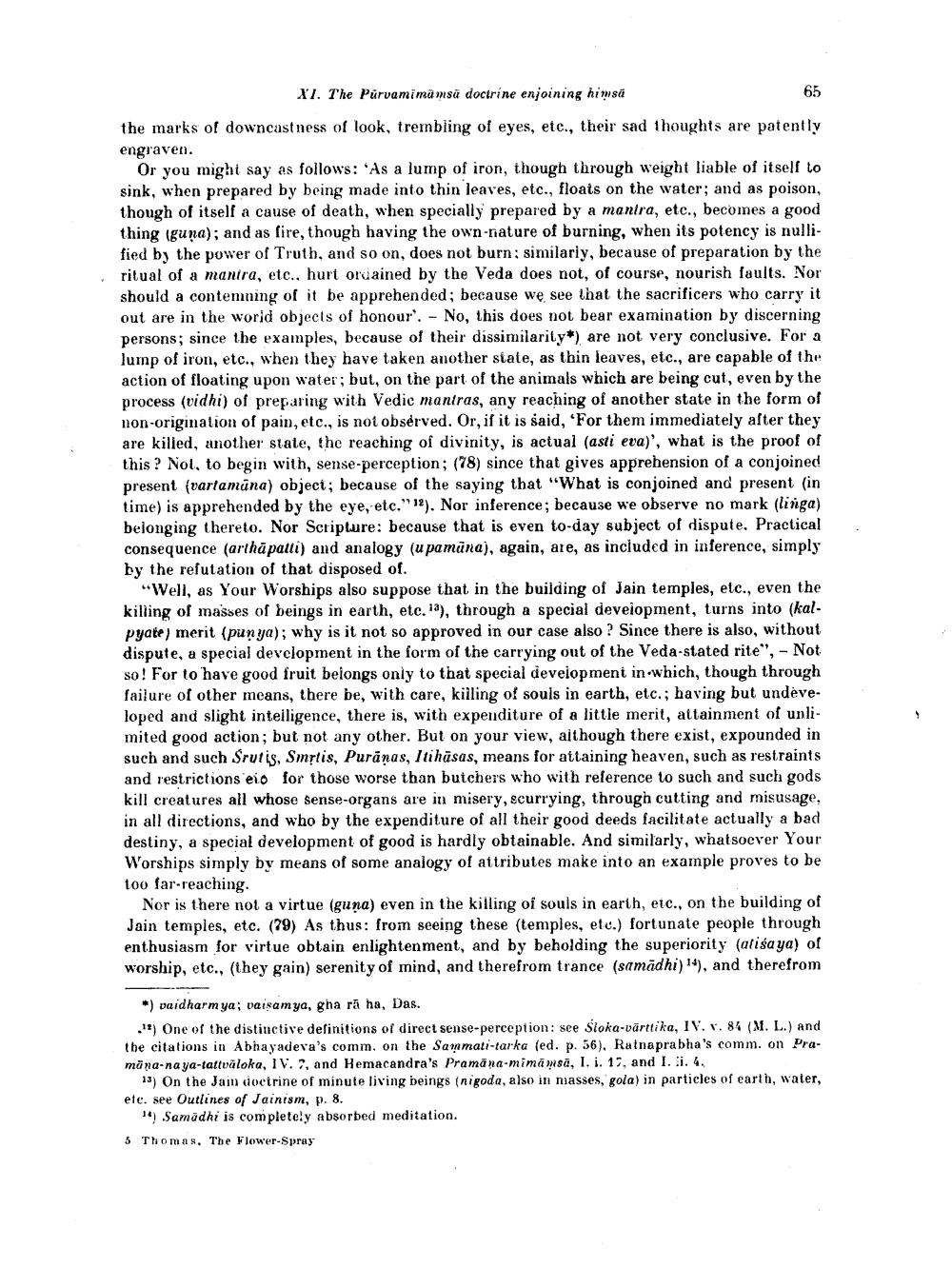________________
X7. The Purvamimamsá doctrine enjoining himsa
the marks of downcastness of look, trembling of eyes, etc., their sad thoughts are patently engraven.
Or you might say as follows: 'As a lump of iron, though through weight liable of itself to sink, when prepared by being made into thin leaves, etc., floats on the water; and as poison, though of itself a cause of death, when specially prepared by a mantra, etc., becomes a good thing (guna); and as fire, though having the own-nature of burning, when its potency is nullified by the power of Truth, and so on, does not burn: similarly, because of preparation by the ritual of a manira, etc., hurt ordained by the Veda does not, of course, nourish faults. Nor should a contemning of it be apprehended; because we see that the sacrificers who carry it out are in the world objects of honour'. - No, this does not bear examination by discerning persons; since the examples, because of their dissimilarity*) are not very conclusive. For a lump of iron, etc., when they have taken another state, as thin leaves, etc., are capable of the action of floating upon water; but, on the part of the animals which are being cut, even by the process (vidhi) of preparing with Vedic mantras, any reaching of another state in the form of non-originalion of pain, etc., is not observed. Or, if it is said, 'For them immediately after they are killed, another state, the reaching of divinity, is actual (asti eva)', what is the proof of this ? Not, to begin with, sense-perception; (78) since that gives apprehension of a conjoined present (vartamūna) object; because of the saying that "What is conjoined and present in time) is apprehended by the eye, etc." 12). Nor inference; because we observe no mark (linga) belonging thereto. Nor Scripture: because that is even to-day subject of dispute. Practical consequence (arthāpatti) and analogy (upamāna), again, are, as included in inference, simply by the refutation of that disposed of.
"Well, as Your Worships also suppose that in the building of Jain temples, etc., even the killing of masses of beings in earth, etc.), through a special deveiopment, turns into (kalPyate) merit (punya); why is it not so approved in our case also ? Since there is also, without dispute, a special development in the form of the carrying out of the Veda-stated rite", - Not so! For to have good fruit belongs only to that special development in which, though through failure of other means, there be, with care, killing of souls in earth, etc.; having but undeve. loped and slight inteiligence, there is, with expenditure of a little merit, attainment of unlimited good action; but not any other. But on your view, although there exist, expounded in such and such Srutis, Smrtis, Puranas, Itihāsas, means for attaining heaven, such as restraints and restrictions eio for those worse than butchers who with reference to such and such gods kill creatures all whose sense-organs are in misery, ecurrying, through cutting and misusage, in all directions, and who by the expenditure of all their good deeds facilitate actually a bad destiny, a special development of good is hardly obtainable. And similarly, whatsoever Your Worships simply by means of some analogy of attributes make into an example proves to be too far-reaching
Nor is there not a virtue (guna) even in the killing of souls in earth, etc., on the building of Jain temples, etc. (79) As thus: from seeing these (temples, etc.) fortunate people through enthusiasm for virtue obtain enlightenment, and by beholding the superiority (ati saya) of worship, etc., (they gain) serenity of mind, and therefrom trance (samadhi)), and therefrom
*) vaidharm ya; vaisamya, gha rá ha, Das. .") One of the distinctive definitions of direct sense-perception: see Sloka-vārttika, IV. v. 84 (M. L.) and the citations in Abhayadeva's comm. on the Sammati-tarka (ed. p. 56), Ratnaprabha's comm. on Pramüna-na ya-tattväloka, IV.?, and Hemacandra's Pramana-mimāsā, 1. i. 17, and I. i. 4.
13) On the Jam doctrine of minute living beings (nigoda, also in masses, gola) in particles of earth, water, ete. see Outlines of Jainism, p. 8.
") Samüdhi is completely absorbed meditation. 5 Thomas, The Flower-Spray




